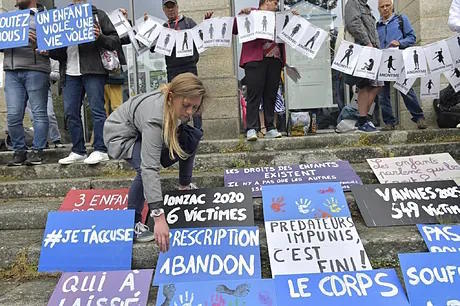It was the sentence that everyone expected and feared: twenty years in prison for Joël Le Scouarnec, the 74-year-old former French surgeon accused of sexually abusing 299 children, many of them under 11 years old and while they were under the effects of anesthesia. "If we were in the United States, the combined sentences would reach 2,000 years in prison," warned the prosecutor Stéphane Kellenberger, adding to the disappointment among the victims due to the "law of silence" that has surrounded the largest pedophilia trial in the history of France.
Six months after the great media and social impact of the case of Gisèle Pelicot, the woman drugged by her husband and raped by 50 men, the trial against the "devil in a white coat" who raped 111 minors and abused 189 in the back rooms of French hospitals was relegated to the background by the media and systematically ignored as a "taboo" topic by the political class.
A group of victims, led by Manon Lemoine (who was 11 years old when she was raped by Le Scouarnec), protested outside the courts of Vannes, the peaceful walled town in French Brittany where the trial took place. The victims demand the opening of a parliamentary investigation into the system failures that allowed the depraved surgeon - who described himself in his diaries as "fetishistic, sadistic, and pedophilic" - to act with total impunity in several hospitals for over two decades.
"They have tried to turn him into a monster, but the real monster is the society that created him and allowed it," declared Lemoine, who also denounced the lack of support for the victims and the situation they were forced into. Some of them preferred not to come forward to avoid reopening childhood wounds. Others were resigned to revealing their identities to seek media attention (during the trial, it emerged that two of them had committed suicide years ago unable to cope with the trauma).
"I do not ask for leniency from the court, just grant me the right to be a better person," declared with chilling coldness Dr. Le Scouarnec in his final appearance before the court, three months after his initial confession in which he openly admitted guilt: "If I appear before you, it is because, indeed, being mostly children, I committed atrocious acts."
"Today I am perfectly aware that these wounds are indelible and irreparable," admitted the former surgeon, who filled his diaries with a chilling account of his abuses. "I owe it to all those people and their loved ones to take responsibility for my actions, and for the consequences they may have had and will undoubtedly continue to have throughout their lives."
Le Scouarnec was already serving a 15-year prison sentence before sitting in the dock this time. He was convicted in 2020 for the rape of two nieces, a six-year-old patient, and a neighbor. "I didn't know, I never suspected anything," his ex-wife Marie-France, suffering from a respiratory illness, testified in one of the most dramatic moments during the trial.
Until 2017, when he was finally reported by the family of his underage neighbor, the surgeon led a flawlessly double life. His own lawyer described how his "descent into hell" occurred, living alone in a shed, alcoholized, spending hours watching images of child abuse on the dark web, and consoling himself with a collection of child-sized inflatable dolls ("I felt an emotional connection with them because they did what I wanted," he confessed).
During the trial, it was proven how the FBI already in 2014 informed the French authorities that Le Scouarnec had accessed internet portals with images of child abuse. Thierry Bovalot, a psychiatrist at one of the provincial hospitals in Brittany where he worked, recalled how he tried to raise the alarm about the suspicious behavior of the surgeon with his child patients (spending time locked up with them before and after surgeries) and how medical authorities ignored him.
"Regional hospitals desperately needed surgeons, and those who arrived were welcomed as if they were messiahs," explained a hospital administrator during the trial. "There were failures and cover-ups at all levels of the hierarchy," admitted another. "I was expressly advised not to talk much about that person," a doctor admitted.
In 2015, an investigation was finally opened following a complaint. Le Scouarnec was "accompanied" to the police station to testify. There was even a home search, but he was not arrested. The investigation resulted in a four-month suspension as a doctor without the need for follow-up or psychological treatment.
Frederic Benoist, representing the NGO La Vox de LEnfant (The Voice of the Child), denounced during the trial "the high level of institutional dysfunction" of the case that should have served to break the taboo of child abuse in France, and yet has ended with a sense of collective frustration.
"There is an 'omertà' on this issue globally, but particularly in France," denounced Myriam Guedj-Benanyoun, a lawyer for one of the victims, pointing her accusing finger at "the patriarchal society in which men who reach a respectable position, in fields like medicine, are out of reach and benefit from the silence of those who should have spoken up."
"This trial has been a kind of laboratory test in which 300 victims have participated," concluded the lawyer. "I sincerely hope that it will end up changing France." It is estimated that the total number of victims of the "devil in a white coat" could reach 400. The prosecutor has anticipated that there will likely be a new trial with the cases that have emerged in recent months.
